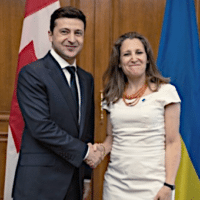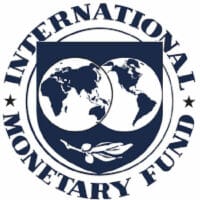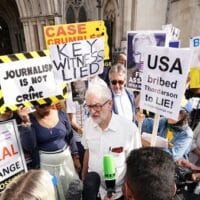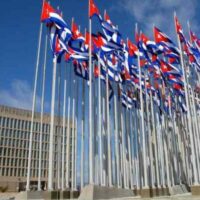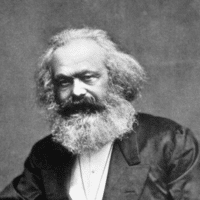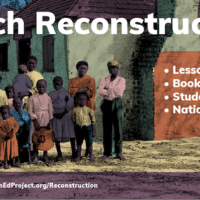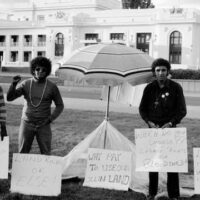-
In response to capitalist economic turmoil, war funding soars
On Jan. 24, stocks were falling, with the S&P 500 Index down 3.8%, the Dow Industrial Average down 2.7% and the Nasdaq Composite down 4.5%. The widespread sell-off for the Dow and the S&P 500 started on the second trading day in January; and for the Nasdaq in November. The Nasdaq is down nearly 20% from its high in November.
-
Non-capitalist mixed economies: what makes a socialist?
In this paper I attempt to provide a short overview of the subject. Words like democracy, freedom, anarchist, Marxist, communist are used in so many different meanings that they become meaningless. One such word is “socialist.” – László Tütő
-
The Petro-War of Chrystia Freeland: Canada’s military support for Ukraine
According to the Globe and Mail, the Minister of Finance, Chrystia Freeland, is in charge of the campaign of military support for the Ukraine.
-
IMF says to Nepal Rastra Bank: “COVID-19 related support measures in the financial sector should however be gradually unwound, and the remaining ones should be targeted and time bound
The International Monetary Fund (IMF) has expressed dissatisfaction over the role played by Nepal Rastra Bank to ensure stability of Nepal’s banking sector.
-
Replacing imports to guarantee greater biotechnological sovereignty in the production of medicine
Interview with president of Cuba’s leading pharmaceutical enterprise group, BioCubaFarma, working to strengthen the country’s technological sovereignty and contribute to the population’s quality of life.
-
Africa was at the centre of Lenin’s work
Vladimir Ilyich Lenin, the father of Bolshevism, never stepped foot in Africa, but his influence upon the continent has been tremendous. Alongside the ideas of Karl Marx and Frederick Engels, Lenin’s revolutionary theories provided the framework for an entire generation of African socialists during the twentieth century.
-
U.S. reminds India it’s showtime
The Biden-Harris Administration is sensing that Modi Govt, a perceived ally, is not to be seen as its war machine revs up in anticipation of a horrific war. Typically, if a country is not with the U.S., then, it must be against it. But India falls in a category by itself.
-
Wikileaks’ invaluable contributions to journalism and people’s movements
The information shared by Wikileaks has strengthened the resistance against repressive governments by exposing the gaps between their actions and their carefully crafted narratives.
-
Havana Syndrome, the U.S.’s Monumental Hoax
Last week, the United States decided to recognize for the first time in five years that the phenomenon baptized as “Havana Syndrome” is nothing more than a big farce. On Thursday, the U.S. Central Intelligence Agency (CIA) admitted that its allegations against Cuba for the so-called “health incidents” suffered by CIA officials in La Havana back in 2016 were not caused by “a deliberate attack.”
-
On the significance of the polemical in Marxism
A polemic for revolutionaries is a militant dialogic practice to reveal the contradictions of a position, hammering it down to break open its hardened crust in order to rescue life from the stifle of the canon.
-
Make the whole world know that the South also exists: The Fourth Newsletter (2022)
The political and cultural divisions that widened during the Trump years continue to inflict a heavy toll on U.S. society, including over the government’s ability to control the COVID-19 pandemic.
-
Censorship by algorithm does far more damage than conventional censorship
Journalist Jonathan Cook has a new blog post out on his experience with being throttled into invisibility by Silicon Valley algorithmic suppression that will ring all too familiar for any online content creators who’ve been sufficiently critical of official western narratives over the last few years.
-
Geothermal green heating part of China’s decarbonization plans
The city of Xian’s geothermal district heating in Shaanxi Province China serves as an example of the country’s decarbonization plans.
-
U.S. government pays big money for bad news about Cuba
The cruder U.S. methods for destroying Cuba’s revolutionary government—military attacks, bombings of hotels and a fully-loaded airplane, violent attacks on officials, biological warfare—did not work. Nor has economic blockade, which of course continues. A more subtle approach also exists. Like the blockade, its purpose is to cause despair and then dissent.
-
Graphika: The Deep State’s Beard for Controlling the Information Age
Semi-state actors play a very important role in today’s online landscape and in the 1970s, Graphika employees would likely have been working directly for the CIA.
-
National Report on the Teaching of Reconstruction
In his 1935 book, Black Reconstruction in America, W. E. B. Du Bois wrote, “One cannot study Reconstruction without first frankly facing the facts of universal lying.” He denounced the Dunning School, the dominant approach to Reconstruction at the time, which denied Black achievements and celebrated white supremacy.
-
Roe v. Wade 49th Anniversary—Much is at Stake
January 22 is the forty-ninth anniversary of the Roe v. Wade decision, in which the Supreme Court ruled that a women’s right to choose to have an abortion falls within the right to privacy protected by the 14th Amendment, making abortion legal nationally.
-
Amazon and the power of big digital platforms
Platform power is often traced to markets, implying anti-trust action. The source, and the solution, lie elsewhere.
-
Abolish long-term care
The COVID-19 pandemic shone a spotlight on the horrific conditions in long-term care facilities. The institutions are a perfect storm for outbreaks: poor ventilation, understaffing, insufficient personal protective equipment (PPE), a lack of regulation, and years of underfunding.
-
Celebrating 50 years of the Aboriginal Tent Embassy
The longest protest for Indigenous land rights, sovereignty and self-determination in the world, the Aboriginal Tent Embassy, located on Ngunnawal land in Canberra, will mark its 50th anniversary on 26 January. Established by Aboriginal activists to demand land rights, the Embassy has been a key site for the struggle for Indigenous rights ever since.



